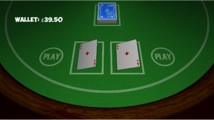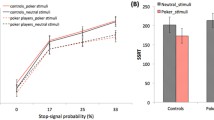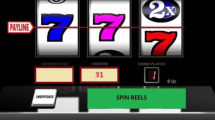Abstract
A failure to inhibit punished responses is central to problematic gambling. We used a computerised card playing game to determine if this failure can be ameliorated by imposing a delay between feedback from the previous trial and the opportunity to play the next card. We compared two experimental conditions: No pause (Standard task) and a 5-s pause (Pause task). Community-based problematic gamblers (n = 42) were compared with a control group (n = 39). Number of cards played (and cash won/lost) and latency of response were measured. Results show that, compared to a control group, problematic gamblers perseverated longer and lost more money on the Standard task, but this deficit was abolished by the imposition of a 5-s pause. Results suggest that, by strengthening inhibitory control processes, problematic gambling on computer gaming machines can be significantly reduced by the imposition of a simple short-delay before the next bet.


Similar content being viewed by others
References
American Psychiatric Association. (1994). Diagnostic and statistical manual of mental disorders (4th ed.). Washington, DC: American Psychiatric Press.
Corr, P. J. (2004). Reinforcement sensitivity theory and personality. Neuroscience and Biobehavioural Reviews, 28, 317–332.
Corr, P. J. (2010). Automatic and controlled processes in behavioural control: Implications for personality psychology. European Journal of Personality, 24, 376–403.
Dixon, M. R., Marley, J., & Jacobs, E. A. (2003). Delay discounting by pathological gamblers. Journal of Applied Behavior Analysis, 36, 449–458.
Dixon, M. R., & Schreiber, J. (2002). Utilizing a computerized video poker simulation for the collection of experimental data on gambling behavior. The Psychological Record, 52, 417–428.
Dixon, M. R., & Schreiber, J. (2004). Near-miss effects on response latencies and win estimations of slot machine players. The Psychological Record, 54, 335–348.
Gambling Act 2005. London: The Stationary Office.
Goudriaan, A. E., Oosterlaan, J., de Beurs, E., & van den Brink, W. (2005). Decision making in pathological gambling: A comparison between pathological gamblers, alcohol dependents, persons with Tourette syndrome and normal controls. Cognitive Brain Research, 23, 137–151.
Gray, J. A., & McNaughton, N. (2000). The neuropsychology of anxiety: An enquiry into the functions of the septo-hippocampal system. Oxford: Oxford University Press.
Gray, J. A., & Smith, P. T. (1969). An arousal-decision model for partial reinforcement and discrimination learning. In R. Gilbert & N. S. Sutherland (Eds.) Animal discrimination learning (pp. 243–272). London: Academic.
Griffiths, M. (2004). Betting your life on it. British Medical Journal, 329, 1055–1056.
Lesieur, H. R., & Blume, S. B. (1987). The South Oaks Gambling Screen (SOGS): A new instrument for the identification of pathological gamblers. American Journal of Psychiatry, 144, 1184–1188.
McCormick, R. A. (1993). Disinhibition and negative affectivity in substance abusers with and without a gambling problem. Addictive Behaviours, 18, 331–336.
McNaughton, N., & Corr, P. J. (2009). Central theories of motivation and emotion. In G. G. Berntson & J. T. Cacioppo (Eds.), Handbook of Neuroscience for the Behavioural Sciences (pp. 710–730). London: Wiley.
National Research Council. (1999). Pathological gambling: A critical review. Washington, DC: National Academy Press.
Newman, J. P., & Lorenz, A. (2003). Response modulation and emotion processing: Implications for psychopathy and other dysregulatory psychopathology. In R. J. Davidson, K. Scherer, & H. H. Goldsmith (Eds.), Handbook of affective sciences (pp. 1043–1067). Oxford: Oxford University Press.
Newman, J. P., & Wallace, J. F. (1993). Diverse pathways to deficient self-regulation: Implications for disinhibitory psychopathology in children. Clinical Psychology Review, 13, 699–720.
Newman, J. P., Patterson, C. M., & Kosson, D. S. (1987). Response perseveration in psychopaths. Journal of Abnormal Psychology, 96, 145–148.
Patterson, C. M., Kosson, D. S., & Newman, J. P. (1987). Reaction to punishment, reflectivity, and passive avoidance learning in extraverts. Journal of Personality and Social Psychology, 52, 565–567.
Productivity Commission. (2010). Gambling. Canberra: Productivity Commission.
Raylu, N., & Oei, T. P. S. (2002). Pathological gambling a comprehensive review. Clinical Psychology Review, 22, 1009–1061.
Schreiber, J., & Dixon, M. R. (2001). Temporal characteristics of behavior on random-ratio schedules observed during slot machine play. Psychological Reports, 89, 67–72.
Stinchfield, R. (2002). Reliability, validity, and classification accuracy of the South Oaks Gambling Screen (SOGS). Addictive Behaviors, 27, 1–19.
Vitaro, F., Arseneault, L., & Tremblay, R. E. (1999). Impulsivity predicts problem gambling in low SES adolescent males. Addiction, 94, 565–575.
Wardle, H., Moody, A., Spence, S., Orford, J., Volberg, R., Jotangia, D., et al. (2011). British gambling prevalence survey 2010. London: The Stationary Office.
Author information
Authors and Affiliations
Corresponding author
Rights and permissions
About this article
Cite this article
Thompson, S.J., Corr, P.J. A Feedback-Response Pause Normalises Response Perseveration Deficits in Pathological Gamblers. Int J Ment Health Addiction 11, 601–610 (2013). https://doi.org/10.1007/s11469-013-9440-7
Published:
Issue Date:
DOI: https://doi.org/10.1007/s11469-013-9440-7




